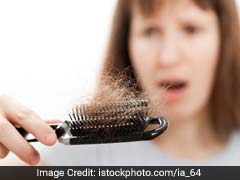The medical term for hair loss is alopecia. Pattern baldness (androgenetic alopecia), the most common type of alopecia, affects roughly one-third of men and women.

Many conditions, diseases, and improper hair care result in excessive hair loss.
- Improper hair cosmetic use or improper hair care - Many men and women use chemical treatments on their hair, including dyes, tints, bleaches, straighteners etc. These treatments rarely damage hair if they are done correctly. However, the hair can become weak and break if any of these chemicals are used too often. Hair can also break if the solution is left on too long, if two procedures are done on the same day, or if bleach is applied to previously bleached hair. If hair becomes brittle from chemical treatments, it is best to stop until the hair has grown out.
- Diseases - Diseases like diabetes, lupus and thyroid disorders can cause hair loss. Both an over-active thyroid and an under-active thyroid can cause hair loss. Your doctor can diagnosis thyroid disease with laboratory tests. Hair loss associated with thyroid disease can be reversed with proper treatment.
- Poor nutrition - Having inadequate protein or iron in your diet or poor nourishment in other ways can cause you to experience hair loss. Fad diets, crash diets and certain illnesses, such as eating disorders, can cause poor nutrition. Inadequate protein in diet or abnormal eating habits may lead to protein malnutrition. The body will save protein by shifting growing hair into the resting phase. Massive hair shedding can occur two to three months later. Hair can then be pulled out from the roots fairly easily. This condition can be reversed and prevented by consuming adequate amounts of protein.
- Medications - Certain drugs used to treat gout, arthritis, depression, heart problems and high blood pressure may cause hair loss in some people. Taking birth control pills also may result in hair loss in some women.
- Recent high fever, severe flu or surgery - You may notice you have less hair three to four months after events such as an illness or surgery. These conditions cause hair to shift rapidly into a resting phase meaning you'll see less new hair growth. A normal amount of hair typically will appear after the growth phase resumes.
- Infancy - Newborns often lose hair during the first several months of life. This baby hair is eventually replaced by more permanent hair. It's also common for babies to lose a patch of hair on the back of their heads from rubbing against mattresses, playpens and car seats. Hair will grow back once a baby begins to spend more time sitting up.
- Shampooing, combing and brushing too often - This can also damage hair, causing it to break. Using a cream rinse or conditioner after shampooing will make it easier to comb and more manageable. When hair is wet, it is more fragile, so vigorous rubbing with a towel, and rough combing and brushing should be avoided. Do not follow the old rule of 100 brush strokes a day that damages hair. Instead, use wide toothed combs and brushes with smooth tips.
- Hereditary thinning or balding - Hereditary balding or thinning is the most common cause of hair loss. The tendency can be inherited from either of the parents. Women with this trait develop thin hair, but do not become completely bald. The condition is called androgenetic alopecia.
- Childbirth - When a woman is pregnant, more of her hair will be growing. However, after a woman delivers her baby, many hair enter the resting phase of the hair cycle. Within two to three months, some women will notice large amounts of hair coming out in their brushes and combs. This can last one to six months, but resolves completely in most cases.
- Birth control pills - Women who lose hair while taking birth control pills usually have an inherited tendency for hair thinning. If hair thinning occurs, a woman can consult her gynecologist about switching to another birth control pill. When a women stops using oral contraceptives, she may notice that her hair begins shedding two or three months later. This may continue for six months when it usually stops. This is similar to hair loss after the birth of a child.
- Major surgery/chronic illness - Anyone who has a major surgery may notice hair loss within one to three months afterwards. The condition reverses itself within a few months but people who have a severe chronic illness may shed hair indefinitely.
- Fungus infection (Ringworm) of the scalp - This is caused by a fungus infection. Ringworm (which has nothing to do with worms) begins as small patches of scaling that can spread and result in broken hair, redness, swelling, and even oozing.
- Low serum iron - Iron deficiency occasionally leads to hair loss. Some people do not have enough iron in their diets or may not fully absorb iron. Women who have heavy menstrual periods may develop iron deficiency. Low iron can be detected by laboratory tests and can be corrected by taking iron pills.
Disclaimer: This content including advice provides generic information only. It is in no way a substitute for qualified medical opinion. Always consult a specialist or your own doctor for more information. NDTV does not claim responsibility for this information.
DoctorNDTV is the one stop site for all your health needs providing the most credible health information, health news and tips with expert advice on healthy living, diet plans, informative videos etc. You can get the most relevant and accurate info you need about health problems like diabetes, cancer, pregnancy, HIV and AIDS, weight loss and many other lifestyle diseases. We have a panel of over 350 experts who help us develop content by giving their valuable inputs and bringing to us the latest in the world of healthcare.












